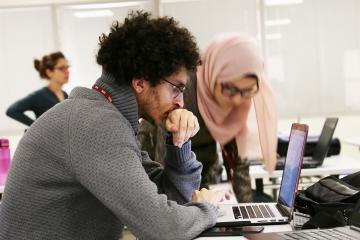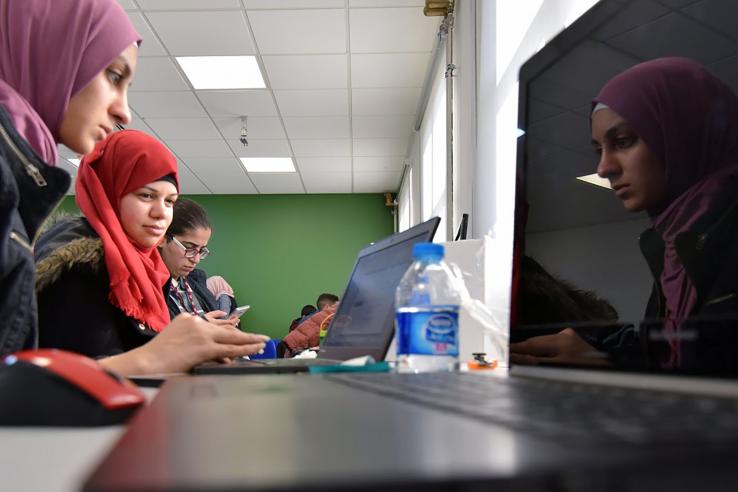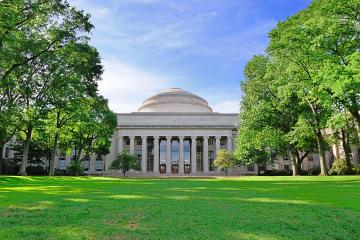
Opening doors for refugee learners: Meet Ruba

This is a guest post from Lauren Benner of the MIT Refugee Action Hub.
More than 68.5 million people around the world have been forced to flee their homes in search of safety and stability. A majority of these refugees face long-term displacement. Most will not have the opportunity to return home for 7-20 years.
For many, this is an entire childhood or young adulthood spent in a host community where there are social and legal impediments to academic and professional integration. This is creating an entire generation of unactivated potential and lost talent.
For these reasons, having the right skills to open doors to meaningful and lasting employment, entrepreneurial endeavors, and higher academic programs is critical for refugees. In places where access to vocational training and higher education is limited, innovations in education and training provide for an essential need for individuals and contributes to the success of larger communities.
Online learning can be an important resource to help refugees learn new skills and launch—or re-launch—their careers.
To support these learners, the MIT Refugee Action Hub (ReACT) and J-PAL are pioneering an innovative program to make the MITx MicroMasters in Data, Economics, and Development Policy (DEDP) accessible to the world’s refugees. The collaboration provides students with a direct path to continued education and expanded professional opportunities.
The ReACT model combines online and in-person education for a blended experience that fosters a culture of learning and collaboration. To help overcome barriers to access faced by displaced students, refugee learners can apply to ReACT to receive scholarships that cover the costs of MicroMasters courses and examination fees.
To facilitate career growth, learners selected for the scholarship program also participate in a two week Immersion and Acceleration Workshop in Amman, Jordan. The structure of this workshop provides opportunities for students to think creatively and critically, and delve into subject matter with more personal investment than traditional classroom-based, assignment-focused, grades-assessed instruction.
Included in this experience is training in entrepreneurship, innovation, and professional development through classes like Maker Lab, Entrepreneurship Bootcamp, and facilitated meetings with local NGOs. The design promotes social constructivism, or learning within a social context.
Additionally, students are connected to professional internships to enable them to practice the skills they learn. Travel to workshops and internship sites is fully funded under the ReACT scholarship.
Eight learners from six nationalities were accepted to ReACT’s first MicroMasters scholarship cohort this year. All have unique stories.
Meet Ruba: A ReACT MicroMasters Student
Ruba, an 18-year-old Syrian refugee, was enrolled in graduate school in Syria but had to drop out after fleeing violence in her hometown. Constrained both legally and financially, Ruba was left without a clear academic path forward when she was displaced.
After a long asylum process in the Netherlands Ruba gained refugee status there in early 2018. With a background in software and systems engineering, and a strong interest in development economics, she began searching for academic programs that would open doors to more technical and advanced careers.
Now nearly five months into the MicroMasters curriculum, Ruba is well on her way to MicroMasters certification. She has been challenged by the material—the Microeconomics and Data Analysis courses are not easy feats—but with ReACT’s supportive infrastructure, and connections to other students in the scholarship program, she has thrived.
Even further, her perspective as a young female refugee provides her with an important viewpoint and motivation for solving global development issues. By integrating online activities with community support and communication, ReACT has worked to extend scholarship participants’ growth mindset, encouraging retention, resilience, and confidence in pursuing higher education. Ruba plans to join ReACT in Amman, Jordan in January 2019 for the two-week Immersion and Acceleration Workshop.
Ruba shares,
“I can now integrate my prior education as a student of software and systems engineering at Damascus University and my experience as a refugee. I can do something that I have always dreamed of, being a social data expert that comes from the heart of the problem…. like many Syrian refugees, I’ve lost seven years, so time is a crucial element here.”
What’s next?
As refugee scholarship students continue in their MicroMasters in Data, Economics, and Development Policy curriculum, we at MIT ReACT are making preparations to launch our second scholarship for students in MIT’s Computer and Data Sciences Certificate Program. Students from both programs will join MIT ReACT faculty, students and staff in Amman, Jordan for the two-week in-person workshop.
Learn more about MIT ReACT programs and application cycles and the MicroMasters in Data, Economics, and Development Policy.

